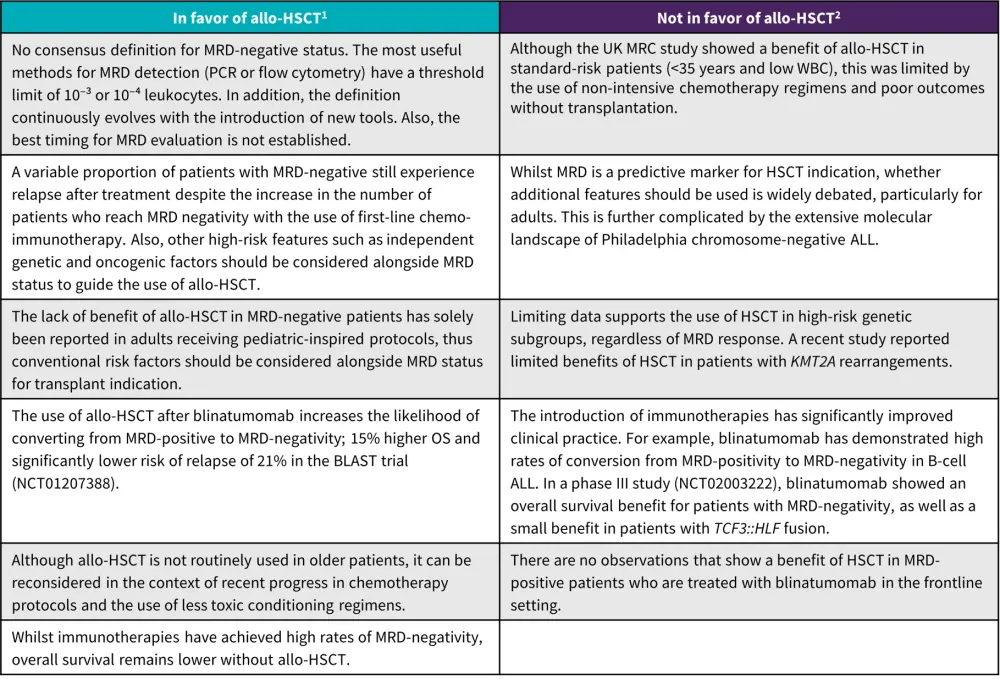All content on this site is intended for healthcare professionals only. By acknowledging this message and accessing the information on this website you are confirming that you are a Healthcare Professional. If you are a patient or carer, please visit Know ALL.
The all Hub website uses a third-party service provided by Google that dynamically translates web content. Translations are machine generated, so may not be an exact or complete translation, and the all Hub cannot guarantee the accuracy of translated content. The all and its employees will not be liable for any direct, indirect, or consequential damages (even if foreseeable) resulting from use of the Google Translate feature. For further support with Google Translate, visit Google Translate Help.
The ALL Hub is an independent medical education platform, sponsored by Amgen, Autolus, Jazz Pharmaceuticals, and Pfizer and supported through an educational grant from the Hippocrate Conference Institute, an association of the Servier Group. Funders are allowed no direct influence on our content. The levels of sponsorship listed are reflective of the amount of funding given. View funders.
Now you can support HCPs in making informed decisions for their patients
Your contribution helps us continuously deliver expertly curated content to HCPs worldwide. You will also have the opportunity to make a content suggestion for consideration and receive updates on the impact contributions are making to our content.
Find out more
Create an account and access these new features:
Bookmark content to read later
Select your specific areas of interest
View ALL content recommended for you
Debate: Should patients with Ph− ALL who reach MRD-negativity receive allo-HSCT?
Over the past 20 years, the prognosis of Philadelphia chromosome-negative (Ph−) B-cell or T-cell acute lymphoblastic leukemia (ALL) has significantly improved with the introduction of intensive chemotherapy protocols and targeted therapies such as immunotoxins, T-cell bispecific engagers, and chimeric antigen receptor T-cell therapies. The use of allogeneic hematopoietic stem cell transplantation is widely debated in patients with Ph− ALL, as these patients can now be effectively treated without this highly toxic procedure.
Here, we present a debate by Chevallier.1 and Boissel.2 published in The Lancet Hematology on whether patients with Ph− ALL who reach measurable residual disease (MRD) negativity should receive allogeneic hematopoietic stem cell transplantation (allo-HSCT).
Key points
- Allo-HSCT is indicated in patients at a high risk of relapse, defined as a high level of MRD or MRD positivity.
- Allo-HSCT is indicated for adult patients in first line therapy and in pediatric patients in both first-line and second-line therapies1; however, the role of transplant in older patients and those with relapsed/refractory disease who are MRD-negative is largely debated.1 The authors opinion on this debate are presented in Figure 1.
Figure 1. Debate on whether allo-HSCT should be given to patients with Ph− ALL who reach MRD-negativity*

ALL, acute lymphoblastic leukemia; allo-HSCT, allogeneic hematopoietic stem cell transplantation; MRC, Medical Research Council; MRD, measurable residual disease; OS, overall survival; PCR, polymerase chain reaction; R/R, relapsed/refractory; WBC, white blood count.
*Adapted from Chevallier.1 and Boissel.2
| Key learnings |
|
References
Please indicate your level of agreement with the following statements:
The content was clear and easy to understand
The content addressed the learning objectives
The content was relevant to my practice
I will change my clinical practice as a result of this content

